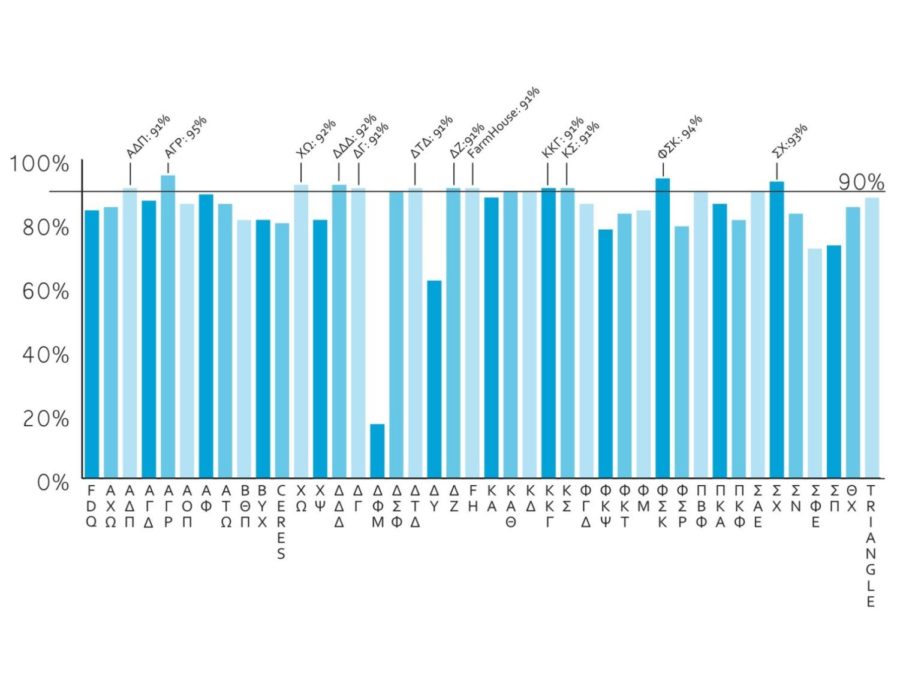Greek life lags behind campus in diversity
April 14, 2016
An open records request filed by the Kentucky Kernel revealed that the racial makeup of UK’s Interfraternal Council fraternities and Panhellenic Conference sororities as a whole are more white than campus.
From 2007 to 2013, IFC, NPC, and United Greek Coalition chapters as a whole were between 13.7 percent and 14.6 percent more white than campus, and diversifying at a slower rate than the university.
With that said, this subsection of Greek Life has become more diverse, from being 94.7 percent white in the 2006-07 school year to 88 percent white in the 2015-16 school year.
“It tells you that white students on average are in Greek organizations at a higher rate, so Greek Life at UK is disproportionately white students, even with the presence of the black Greek organizations,” David Luke, assistant director of the Martin Luther King Jr. Center, said.
While members of UK’s campus and non-National Pan-hellenic Council organizations may not notice the disparity, it is something members of the historically black organizations on campus were aware of from their founding.
“The first thing you hear as a black student is, ‘Don’t join the white fraternities,’ and that’s what they’re referred to as, is white fraternities and sororities. It’s how we see it,” said Isaac Epps, president of Iota Phi Theta Fraternity, Inc. at UK and MLK Center intern. “When I come there, will I feel comfortable to be myself or will I have to change and be something else that I’m not?”
Epps said he did not think the IFC and NPC chapters were inclusive, but neither is the Divine Nine, in his eyes.
According to Epps, with the lack of resources already hindering the NPHC (no houses on campus, fewer members and less chapter money), if the IFC and NPC were inclusive they would pull from the small pool the Divine Nine recruits from, possibly hurting their numbers.
Related editorial: Greeks could help UK inclusivity
He said that this would not be a bad thing necessarily, but pointed out that the Divine Nine were founded to supplement a problem with inclusivity on campus and provide brotherhoods and sisterhoods to people on campus excluded from other organizations.
“We call ourselves the historically black fraternities and sororities because they were founded due to the fact that we were not able to join organizations like that,” Epps said. “One does not feel encouraged to join these types of brotherhoods or sisterhoods because they don’t provide something that makes them feel comfortable.”
But because no one has ever challenged the standards of the IFC and NPC makeup, Epps said they have not really opened themselves up to being inclusive of all kinds of people.
Luke said getting rid of the NPHCs would be problematic because it would be taking away organizations where black students do not feel excluded because of their race, regardless of whether or not the other chapters are desegregated.
“What we saw last year with (Sigma Alpha Eplison) in Oklahoma, there are legacies that don’t just go away by saying, ‘You can go here.’” Luke said, pointing out that the university, which has diversified faster than the IFC and NPC organizations, is making concrete changes to improve diversity. “If you’re truly to be more inclusive then there has to be more work. It can’t just be, ‘Well we want them to come here, how come they’re not?’”
Political science junior Katelyn Lauber said Theta Nu Xi Multicultural Sorority, Inc., which she is president of, was brought to campus because they were aware of this problem, and issues of conformity they saw in Greek Life, as were the members of Delta Upsilon, the most racially diverse organization in IFC.
“Diversity is something we preach. The idea (Delta Upsilon) was built on is we are a different kind of fraternity,” said Matt Davis, the president of Delta Upsilon Fraternity at UK. “We’re built for everyone, we want to get different backgrounds in. We’re kind of the every-man’s fraternity.”
Davis said this was possible because it came to campus in 2013, whereas established fraternities face the pushback of their organization’s traditional makeup.
Henry D’Andrea, president of Farmhouse Fraternity at UK, said this was the main problem his chapter faces in diversifying since many people are misled by the name to believe it is still predominantly agriculturally based.
Farmhouse has one of the highest percentages of white members of any IFC or NPC organization at 91 percent, and had multiple incidences of being 100 percent white between 2007 and 2016, but D’Andrea said it is something he thinks the fraternity can change by increasing their outreach.
Sororities within NPC struggle to diversify as well, Chi Omega being the most white with 92 percent in 2016. Abigail Berger, president of Chi Omega at UK, could not be reached for comment.
One specific occasion that Luke and Epps both expressed was a problem with the cohesion between NPHC, IFC and NPC is the system by which IFC and NPC chapters use members of NPHC organizations for “Stomp-A-Palooza,” an annual UK Greek Life philanthropy event.
After spending hours coming up with and teaching the routines to IFC and PC chapters, the NPHC chapters do not participate in the event itself, and then interaction with the chapters they taught becomes almost nonexistent for the rest of the year, according to Epps. He said that he would equate it to “free labor” under the guise of philanthropic partnership.
Luke said there was not one person to blame for the disparity in Greek Life, but if the IFC and NPC organizations want to increase diversity, it will only come through a change in the way they recruit and represent themselves to minorities.
































































































































































